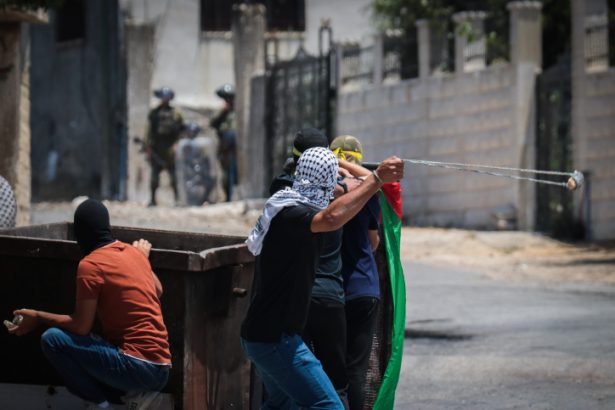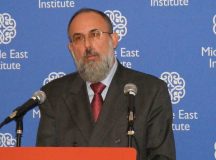Justin Feldman argues that any solution to the conflict must first bring both peoples closer together in better faith. That begins with a range of positive and pragmatic reforms.
I’ve worked across the pro-Israel non-profit world for nearly a decade. Over the years, I’ve acquired historical knowledge, strategic PR communications, and dialogue skills to defend the Jewish state’s existence and its various defensive policies. Yet, the longer I’ve worked in the field, the more nuanced perspectives I’ve reached on issues within Israeli society. I not only mean on Israel’s ineffective bureaucracy, governance, and economic issues that my Israeli family rants about – I mean issues regarding our Palestinian neighbours.
Many of my Israeli-American and Jewish-American colleagues in the field, who also specialise in research on the Arab-Israeli conflict, have grown to develop their own principled stances on some of Israel’s imperfections – including current policies that negatively affect Palestinians. Forming opinions at this stage of our work should be obvious. The clamour in Israel right now on judicial overhaul and other reforms by the latest coalition adds to our curious desire, like many native observers, to capture many issues as they manifest today. We’re not veteran experts from any political establishment, but we’re also not ignorant on the region’s pressing challenges, nor jaded by decades of gridlock.
As longtime millennial workers in the pro-Israel field, we believe that Palestinian terror and institutional incitement is the greatest obstacle to Israeli-Palestinian peace. Full stop. However, one of the greatest issues that comes to mind on Israel’s end, for many of us, is Israel’s entrenchment in the West Bank — a Palestinian-majority territory it gained control over in a defensive war in 1967.
However, in recent interviews, Prime Minister Binyamin Netanyahu stated his vision to utilise relations with Saudi Arabia and other Arab states to push Palestinians to the negotiating table. This, we might hope, would result in greater self-government for the Palestinians, but with Israel maintaining overall security control of the region. Yet, his cabinet’s recent approval of the legalisation of nine Jewish West Bank outposts (against the wishes of the US and new Arab allies), and the threat of weakening the independence of Israel’s judiciary further deepens the tense situation with additional pressure.
Today, Israel has reached the miracle of genuine peace with various Arab states via the Abraham Accords, but peace with Palestinians remains a fading mirage. In the US, ‘anti-normalisation’ policies of Palestinian organisations and global Palestinian stigmas of engaging in dialogue with pro-Israel people stifles the growth of any conversation on peace, just as rejectionism from Palestinian politicians has shut out peace proposals with Israel, providing no alternatives for decades. This is the mainstream Palestinian stance and often comes with the threat of violence for detractors. However, being exposed to Palestinian perspectives and experiences over the years through travel, direct engagement, and social media has prompted curious internal conversations for me with my pro-Israel colleagues (and Palestinian outliers) about peace.
With the realisation that Israelis can’t rely on the Palestinian side to develop a tolerance for free thinking on peace, my conversations with colleagues, former leaders and bureaucrats, and willing Palestinians (not to be named) inspired me to compile 13 potential ways to alleviate the effects of the Israeli-Palestinian conflict. These proposals not only reflect legitimate criticism of Israel by some of the most influential and mainstream Zionists, but they also address various Palestinian grievances directly.
The following 13 proposals are all technically viable objectives – they do not jeopardise Israel’s security apparatus. The only thing potentially standing in the way that must change is the domestic Israeli political demand and the will of Israeli leaders for implementation. In the past few decades, Israel has voluntarily implemented multiple reforms for Palestinians, not limited to taking down barriers along West Bank Palestinian towns no longer posing threats of sniper-fire at Israeli communities, the dismantling of illegal outposts, barriers, and checkpoints altogether, and increasing permits to enter Israel proper for work, medical treatment, prayer, and even leisure. There is plenty more that can be done.
Unlike the BDS movement’s platform, the proposals I make here are not a set of ‘demands’ to coerce Israel into repeating unilateral withdrawal (in this case, from the West Bank), which would create another vacuum for terrorist organisations like Hamas to take over. They are strategic recommendations that, if implemented to a reasonable timetable, may indeed shrink the effects that the conflict has on both populations and gradually erode the animosities that preclude any permanent and comprehensive solution to the conflict.
There will inevitably be disagreements on the terminology and precise reforms that I use from both pro-Palestinian and pro-Israeli advocates. There may certainly be important reform proposals missing from this list or even unforeseen consequences. However, after years of consulting both Palestinian and Israeli individuals – activists, civilians, and retired security personnel on the ground alike – I want to inspire conversation. Following years of disillusionment with the peace process, we need creativity, collaboration, and nuance. It is the only way forward. Here are the top proposals I’ve compiled over the years, written in order of projected feasibility, from most easily achievable to least. Following them is an explanation of the feasibility placements, informed by my prior consultation with former members of Israel’s security and political establishments:
1. Tackle Palestinian corruption
Crack more cases of extortion, corruption, and theft by Palestinian governmental figures, entities, and NGOs. Possibly begin to pay the administrative salaries of PA bureaucratic workers with reasonable wages. This can be done in partnership with responsible stakeholders, with included oversight to monitor effectiveness. Furthermore, incentivise cooperation of bureaucracies and promote reasons to be averse to defection from partnership with Israel, without problematising overall functions of Palestinian autonomy.
2. Address neglected criminal activity in Arab communities of Israel and, where possible, the West Bank
Address neglected criminal activity in the Arab sector of ‘Israel proper’ with more local law enforcement, including inter-tribal violence, extrajudicial ‘revenge’ and ‘honour killings’, hard drug smuggling, as well as domestic abuse against women. Moreover, Israel should expand recreational youth programs and skills-based job training, including in hi-tech and hands-on trades as a positive deterrent against recruitment to terrorist factions and destabilising campaigns. These programmes should also be offered somehow in the West Bank with the help of willing and capable actors, to the extent that it is possible. Should it need the legitimacy of non-Israeli backing, Western or Gulf support should suffice. Create mechanisms that eliminate the chance to exploit funds or mentor salaries for miseducation (as is ubiquitous in UNRWA programs), and, instead, offer relevant supplies and curriculum with deliberate and limited uses.
On a separate, but no less important note, Arab-Israelis should also be encouraged toward more civic engagement and governmental participation. By further integrating Arab-Israelis into Israel in terms of their agency in autonomous affairs and impact on state institutions, the Israeli government can cultivate a greater sense of belonging and citizenship for its non-Jewish citizens — and thus reduce lawlessness and negative tendencies to support enemies of Israel (even merely in political rhetoric), such as supporting hostile and irredentist Palestinians. While not directly connected with relations between Israel and the Palestinians, strengthening the health of Arab-Israeli society can foster trust in Israeli good faith from both Palestinians and the wider Arab world. Further, at a time when polls show a majority of both Israeli Jews and West Bank and Gaza Palestinians no longer having faith in the two-state solution, Arab-Israelis continue to support it by a majority.
3. Allow an increase of entry permits for Palestinians
As aforementioned, proceed to expand the number of permits for entrance to Israel for work and for medical treatment (gradually including permits for Palestinians in diaspora to visit relatives) with sufficient security and vetting mechanisms. Continue to advance more efficient and convenient security checkpoint processes and reduce checkpoints where no longer necessary.
4. Boost coexistence and cooperation initiatives
Promote private investment and expand current public investments in coexistence and cooperation initiatives between Israelis and Palestinians and ensure the ability to intercept hateful indoctrination and radicalisation with civilian exposure (including in the disputed/Palestinian territories).
5. Boost Palestinian urban and rural development
Authorise more legal permits for Palestinian development in the West Bank. Incentivise further Israeli development in the Negev (south) and Galilee (north), simultaneously, providing more jobs and more affordable cost of living. This accommodates population growth and economic growth, without exacerbating land contestation more than before.
6. End home demolitions
End the policy of home demolitions as a penalty affecting families of Palestinians who’ve engaged in terrorism. Not only has this practice failed for years in deterring Palestinians from engaging in terrorism (the murder of civilians to coerce political gains), it also has reinforced the harmful, false narrative that Israel is bent on ‘colonisation and displacement’ of Palestinians. Other corrective means can and should be maintained, such as the recently passed law to revoke the citizenship of offending terrorist citizens and residents.
7. Secure the residency status of Arab Jerusalemites
In furthering the distinction between terrorists and law-abiding civilians, follow the line of Israel’s March 2017 Supreme Court ruling and end problematic practices/policies by the Ministry of Interior in Eastern Jerusalem that revoke the residency status of non-criminal Palestinians who leave the holy city for a number of years.
8. Improve accountability for misconduct in asymmetric incidents
Demonstrate more accountability when penalising IDF servicepersons who mishandle asymmetric incidents, i.e. misconduct when detaining small violent Palestinian children (particularly under the age of 13). This also encapsulates penalising more seriously the scenarios of harassment against non-violent Palestinians at security checkpoints (albeit a less frequent scenario). For obvious threats of asymmetry, conventional non-lethal means would be protected in countering teens that engage in non-lethal acts, while standard measures would be protected regarding countering lethal use of stone-throwing, knives, firearms, fireworks and other explosive devices.
9. Cease property claims trials
Cease major trials that seek to revise property claims in Eastern Jerusalem neighbourhoods widely in one direction (unfairly limiting jurisdiction to Jewish claims in the city) i.e. Sheikh Jarrah/Shimon Ha’Tzadik, while Palestinian refugees and descendants in the West Bank, Gaza, and abroad lack the legal right to revise/reclaim property rights in Israel proper (whether or not they pay rent). This is the case whether they lived on properties owned prior by Ottoman absentee landowners in Israel-proper (they mostly did) or held deeds to their homes.
Also: limit unnecessary expropriations of even partially inhabited land in the West Bank, especially for permanent or prolonged military use. Disputes over lands in these areas determined for nature reserve, heritage site, and eminent domain cases should also take into further consideration local residents, including Palestinian or non-Jewish residents who inhabited said land even as recently as a few decades ago (i.e. Silwan/Shiloach and Massafer Yattah). These land expropriations, especially if handed over to Jewish olim, and not to the families of Jewish owners in question, may very much be superfluous acts that only garner more animosity and support for Palestinian propagandistic arguments of Israel’s “destructive colonial nature”. Furthermore, providing broader access to bilingual Arabic and Hebrew-speaking attorneys and translators is a humane necessity, regardless of any potential decline in such cases.
10. Reform Knesset candidacy laws
Officially bar citizens who were rejected or discharged from Israel’s army on grounds of radical or racist behaviour or ideology from serving in Knesset (parliament) and bureaucratic state positions. This includes involvement in extremist organisations as well. No parliamentary coalition should be able to resort to such morally reprehensible relations to secure its governmental rule.
11. Ensure proportionate jail sentences
Prosecute extrajudicial murders, try, and jail offending military personnel and civilians – both Jewish and Arab with proportionate jail sentences. On the other hand, any assailant who was found to have planned a terror attack, but was caught prior to attempting it, should not be released after just a short duration (even if they confessed and turned themselves in, as in the case of one Palestinian recently).
12. Prevent the increase and expansion of remote settlements
Israel should take legislative action to prevent the increase and expansion of remote settlements and outposts situated between small gaps of Areas A and B of Judea and Samaria (the West Bank). Examples include: Yitzhar, Nahalat Yosef, Pnei Kedem, and so forth. Israel may simultaneously, in its own right, address foreign-funded efforts to construct similar irredentist Bedouin outposts from the Negev near Gaza to the Jordan Valley (Area C). The Israel Defense Forces (IDF) can still coordinate activities in these areas as necessary, as it is currently doing with West Bank counter-terror via Operation Breaking the Wave. The settlement blocs on the Green Line (future border) would be retained by Israel, as was acknowledged to a degree already by both sides in previous waves of negotiations.
13. Relocate remote settlements and outposts
A step further from merely ceasing expansion of remote settlements and outposts: Israel can declare illegal and relocate these structures situated in between Areas A and B of Judea and Samaria (the West Bank) to the immediate range of settlement blocs on the Green Line or to Israel proper (e.g. Yitzhar, built deep into the West Bank near Nablus/Shechem in Area A). Once again, the IDF can still coordinate activities in these areas as necessary. The settlement blocs on the Green Line (future border) would be retained by Israel, as was acknowledged by both sides in previous waves of negotiations.
Feasibility of the Proposals
Expounding upon the rankings of aforementioned proposals in terms of political feasibility and ease can help frame where to begin reform – however, the order should not be read as something set in stone. Whichever reforms can be achieved given the conditions of the time should be pursued as much as possible.
Beginning with the most immediately feasible reform: any Israeli administration and the Israeli public would support the initiative of tackling Palestinian corruption. In fact, there are various Israeli efforts to tackle the issue already, from lawfare organisation Shurat HaDin, to research groups like Palestinian Media Watch (PMW) and the Jerusalem Center for Public Affairs. However, fully addressing the region’s political corruption must also include corrupt elements within Israel’s government. The judicial reform debate will continue to play a role in delays on the latter.
Expanding Israeli law enforcement in local Arab communities to reduce crime is very likely to finally occur, including within the current administration. However, because a far-right politician, Itamar Ben-Gvir, is in charge of the ministry dealing with the issue, the extent of the crackdown may also produce extraneous and damaging results. Moreover, recreational youth programmes, like affirmative action job recruitment, training, and education are all things that the Israeli government has invested in – including under PM Netanyahu. Expanding these programmes to the West Bank by Israel is also possible, but less likely in the immediate future. Amid the Israeli swing to the hard-right and focus on physical Israeli security, there is also waning attention for Palestinians among the Gulf states at the moment, in the form of aid and general support. Moreover, during the Bennett-Lapid government, Arab-Israeli civic engagement may have increased. With the current far-right government of Netanyahu, Arab-Israeli economic development, but not political development, remains the focus. A future administration may reprioritise this – even beginning at the local and municipal levels.
The incremental increase of entry permits into Israel for work and medical treatment for Palestinians is already happening. However, if increased significantly, it is more likely for West Bank Palestinians than Gaza Strip Palestinians (due to control of the Strip by Hamas). Certainly, it is not likely to be granted to as many Palestinians in the diaspora for years to come, although this should not be taken off the table.
Some Israelis are sceptical that gathering a handful of Israeli Jewish, Israeli Arab, and Palestinian children for coexistence initiatives can produce a lasting impact by the time the latter groups grow up and, so they fear, retreat back to former belief systems and biased tendencies. However, a future Israeli government that invests with allies into expanding such initiatives across age groups may produce better and more sustainable outcomes (especially in tandem with the other reforms).
Palestinian construction in Areas A and B of the West Bank has already been expanding over the years and should continue, as long as Palestinians do not unilaterally expand into Area C. The challenge is the overly scrupulous and arbitrary Israeli evictions and demolitions of Palestinian homes and businesses, some of which are merely extensions of already-owned Palestinian properties (cases which, actually, far exceed the demolitions of homes of terrorists). Israel’s concern is Palestinian unilateral overwriting of Oslo arrangements, by gradually connecting parts of Areas A and B (eliminating the security gaps of Area C that separate them) before negotiating a permanent final status agreement with Israel. While this issue also affects Israeli property development in the West Bank and even in Israel proper, it is selectively applied and enforced. Ending home demolitions specifically is not likely to be sustained in any hard-right Israeli coalition, but definitely something that may be reconsidered in hopefully a (near) future administration.
Due to the status of Jerusalem for Israel, securing the residency status of Arab Eastern Jerusalemites is not only unlikely for Prime Minister Netanyahu’s government, but also for an administration similar to the Bennett-Lapid government, which has a special demographic trajectory in mind, given the absence of genuine Palestinian peace partners. Note: Israel should still be able to reserve the right to revoke the citizenship/residency of convicted Palestinian terrorists receiving funds from the Palestinian Authority (as was recently approved in the Knesset in February 2023).
Improving the accountability for misconduct in asymmetric incidents is possible in any administration with a responsible IDF establishment that independently handles incidents accordingly. However, the current administration is much less likely to emphasise the need for stricter repercussions for misconduct.
The Bennett-Lapid administration stated that it would not act to enforce the ruling of the Sheikh Jarrah/Shimon Ha’Tzadik property dispute in Eastern Jerusalem. However, other disputed court cases and expropriations proceeded under their government. The current Netanyahu government is unlikely to have any more generous an approach in the long-term and may seek to escalate court cases to resolution as much as possible.
Reforming Knesset candidacy laws could only be enacted years from now, in a much different administration. While elusive in the immediate term, a reform of this kind is not entirely unprecedented, as the Knesset invoked 1948 anti-terrorism laws to ban the racist, anti-Arab Kach and Kahane Chai parties in 1992 and 1994 respectively. The majority of Israelis must continue to press hard for barring those convicted of racist incitement or those rejected by the IDF for extremism – as with Itamar Ben Gvir – from political service.
While Israeli government and society generally condemn, prosecute, and imprison Jewish far-right terrorists with long sentences, there have been at least a handful of controversial cases where IDF soldiers who took questionable actions in certain circumstances were released from prison with sentences much shorter than originally decided by military court. The feasibility that IDF soldiers who commit an unlawful murder of a Palestinian would be given equal jail sentences to the Palestinians who unlawfully murder an Israeli is abysmal in the current administration and relatively unlikely to take place in any near future administration – although it is not impossible.
In the paraphrased words of an anonymous former deputy Israeli national security chief:
The idea is that these are our kids. You’ve got 18 year-olds [soldiers] acting out and sometimes they say and do aggressive, rowdy, or problematic things, but they’re facing rocks that can kill them, [ knives,] and guns – often at the same time from crowds of civilians. We shouldn’t expect otherwise or treat them differently than we currently are generally with penalising, unless they do something very serious.
Under the current administration, preventing the expansion of remote settlements and outposts is not to be expected for any prolonged period – particularly as the cabinet legalises them in parts of the West Bank. The previous centre-left/right/Islamist joint coalition arguably couldn’t do much on this either because it was somewhat of a ‘national paralysis’ government. This is definitely a core issue that must be addressed by the Israeli public in order to produce change.
Lastly, the illegalisation and relocation of West Bank remote settlements and outposts is already an occasional practice by the Israeli cabinet and Supreme Court, regardless of who the sitting prime minister is. Major relocations of significant populations may produce political blowback domestically for Israel. However, the cost of embedding Israeli populations between major Palestinian areas will eventually force Israel to absorb hostile and aggravated Palestinian populations through de facto/de jure annexation. This won’t only end the prospects of a Palestinian state, but a Jewish state as well. Expulsion of Palestinians is neither a practical nor a moral alternative. The construction of illegal outposts deep in the West Bank are a smaller, less frequent, and scattered phenomenon, which adds to the challenge of confronting the issue politically. Until credible Palestinian leaders can arise and final status peace talks resume, a sweeping relocation of outposts is not likely to take place. However, more Israelis can call attention to the threat of totalist expansion and letting remote settlements and outposts grow unabated to get their leaders to act.
*
It’s important to acknowledge that there is often a difference between what is legal, what is moral, and what is most beneficial to Palestinian (and Israeli) collective interests. The three can, but do not always overlap. Israeli and Palestinian destinies, however, do in part overlap. Thus, we should move forward and adjust policies accordingly.
Whether you believe in a one-state or two-state solution, the reality is that any solution to this conflict must first bring both peoples closer together in better faith. That begins with a range of positive and pragmatic reforms. The last Knesset coalition under Naftali Bennett and Yair Lapid took more initiative on such measures and indeed had more potential to enact these reforms. However, even in Prime Minister Netanyahu’s new, firmly right-wing coalition, the following proposals are still relevant. This is because sooner than later the Israeli hard-right will have to face their blind spot – their ironic emphasis on preserving the Jewish state, while exacerbating West Bank remote settlement/outpost growth and maximalist annexation prospects that would end it.
With no guarantee of providing a new chance at successful peace negotiations anytime soon, these potential reforms (and the other aforementioned proposals) can very likely have a meaningful role. Such changes can tangibly ‘shrink the conflict’ and influence new generations of Palestinians and Israelis to digest the reality that they inevitably share a future and should engage as neighbours with shared humanity. By effectively eliminating the most prolific Palestinian excuses on the world stage for choosing violence over peaceful exchange and coexistence, Israelis may gradually feel more secure.
This doesn’t mean that all Palestinian detractors will be eliminated, nor will the fulfilment of all these recommendations satisfy all. Extremists rely on derailing peaceful progress with slander and terror to retain control — as during and since the Oslo peace process. It just means that Israelis may gain some reassurance, knowing that such reforms (some unprecedented) may collectively enable the Palestinians to have ideological reconsiderations in any eventual resumed political process in the West Bank. This may provide that, contrary to Oslo/post-Oslo, elections will not devolve into another success of Hamas or other terrorist factions. President Abbas’s time as ‘dictator for life’ is quickly closing in, so the season to sow more good faith may be now.
Israel may even leverage withholding the benefits of some of these reforms — should popular terror campaigns increase — thus preventing counterintuitive perceptions of Israeli capitulation by both the Palestinian and Israeli public. These reforms aren’t about free Israeli handouts to Palestinians. Each measure is aimed at alleviating the trauma both sides experience from the conflict and waging justice where possible as well as bringing Palestinian agency and accountability to the fore. It’s about establishing a basis for a whole new generation of Palestinians to consider peaceful and pragmatic alternatives to their situation out loud, without being violently targeted into silence by their own. A whole new generation has the chance to fathom a new future in the land. Let us provide due efforts for a secure foundation.





































And what “strategic recommendations” does Mr. Feldman have for the Palestinians to implement?
Or is this just another in the tired litany of one-way capitulations for Israel to concede to inveterate rejectionists?